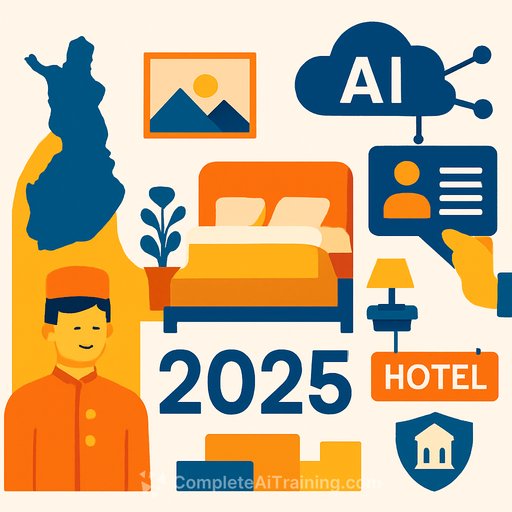The Complete Guide to Using AI in the Hospitality Industry in Finland in 2025
Too Long; Didn't Read:
Finland’s hospitality sector in 2025 benefits from AI through hyper-personalisation and smart rooms that increase RevPAR and ADR. National support includes a EUR 100 million flagship programme and over EUR 200 million from Business Finland, along with PoC grants of €100–200k. About 1 million Finns are being reskilled, and the EU AI Act’s rules (2024–2027) set the regulatory framework.
Hotels and restaurants across Finland are adopting AI tools like chatbots, predictive pricing, and smart-room controls. These technologies help increase revenue and reduce routine tasks. Hyper-personalisation—using guest data to customize offers, room settings, and services in real time—is a key trend. Local pilots show benefits such as fewer order errors and faster service, even in smaller kitchens. The focus for Finnish operators is clear: automate repetitive tasks, track guest preferences, and let staff concentrate on high-value guest interactions like sharing local tips. Picture rooms pre-set to a returning guest’s favorite temperature.
Table of Contents
- What is Finland's AI strategy? (national priorities)
- Does Finland support AI? (funding, programs, and ecosystem)
- What is Finland's AI accelerator? (AI 1000, LUMI & other hubs)
- Finland regulatory context: EU AI Act, draft national law and timelines
- How is AI transforming hotel operations in Finland? (use-case overview)
- Concrete hotel use cases and vendor examples for Finland
- Implementation checklist for Finnish hotels: data, pilots and people
- Legal, compliance and procurement guidance for hotels in Finland
- Conclusion & next steps: opportunities, networks and events in Finland
- Frequently Asked Questions
What is Finland's AI strategy? (national priorities)
Finland’s AI strategy is practical and centred on values. Originating with the 2017 roadmap Finland's Age of Artificial Intelligence, it has evolved through initiatives like AI Business, which provides EUR 100 million in flagship support. The focus is on boosting competitiveness—especially for SMEs—modernising public services, and creating human-centric, ethically governed AI ecosystems that enhance wellbeing rather than replace people.
Key pillars include lifelong learning and reskilling (around 1 million Finns may need it), stronger research-to-market connections, open-data and MyData models for interoperable services, and testbeds such as the LUMI supercomputer and national sandboxes.
Does Finland support AI? (funding, programs, and ecosystem)
Finland supports AI with substantial investment and ongoing practical help aimed at companies and SMEs. Business Finland’s AI Business programme mobilised over EUR 200 million in public/private funds for hundreds of projects. Current funding instruments focus on short proof-of-concept work and growth pilots, including calls targeting generative AI.
Typical PoC projects receive grants between €100,000 and €200,000. SMEs and midcaps can get partial subsidies. Heavy computing needs are met through grants linked to HPC resources.
What is Finland's AI accelerator? (AI 1000, LUMI & other hubs)
Finland’s AI accelerator ecosystem combines executive training, high-performance computing, and production pilots. AI Finland’s AI 1000 offers concise board-level training that helps executives identify 1–2 concrete business initiatives in just a few hours.
The FAIA programme, run with Silo AI, supports organisations in moving pilots into operational deployment over six-month accelerator batches. Infrastructure like LUMI provides access to EuroHPC-class computing power for demanding workloads.
Finland regulatory context: EU AI Act, draft national law and timelines
Finland’s AI regulations for hotels follow the EU AI Act, which came into force on 1 August 2024. Core safeguards triggered on 2 February 2025, and transparency obligations for general-purpose AI models started on 2 August 2025. Finland, like other member states, named national authorities and market surveillance bodies by August 2025.
How is AI transforming hotel operations in Finland? (use-case overview)
AI is streamlining hotel operations by coordinating daily tasks into revenue-focused workflows. Guest interactions are automated with AI chatbots and personalised booking recommendations to improve conversion and upselling.
Revenue managers use machine learning for demand forecasting and dynamic pricing that adapts to local events and competitor activity. Back-of-house benefits include predictive maintenance and IoT-driven housekeeping schedules that reduce downtime and guest complaints. Smart rooms and multilingual virtual concierges enhance comfort for international visitors.
Concrete hotel use cases and vendor examples for Finland
Low-risk pilots are the best way for Finnish hotels to demonstrate AI’s value. Start with personalised booking and guest communication pilots, then add revenue management tools that handle dynamic pricing behind the scenes. Pair front-of-house automation with hyperlocal pilots already showing results.
Don’t overlook people: microlearning and role-based training help staff adopt AI tools quickly.
Implementation checklist for Finnish hotels: data, pilots and people
- Data: Start with clean, reliable data. Consolidate your Property Management System (PMS), channel manager, and booking engine feeds for unified occupancy, ADR, and RevPAR metrics.
- Pilots: Run small, focused pilots targeting one KPI. Measure against baseline data and scale what works. Tight integration is key to turning data into actionable insights.
- People: Invest in staff training with microlearning and role-specific courses to speed up adoption and reduce resistance.
Legal, compliance and procurement guidance for hotels in Finland
Compliance starts with GDPR and Finland’s Data Protection Act. Treat privacy as an operational risk, not just a checklist. When procuring AI solutions, insist on clear Data Processing Agreements (DPAs) with vendors handling guest or employee data.
Conclusion & next steps: opportunities, networks and events in Finland
Finland offers a fertile environment for hoteliers to experiment and implement AI. Engage in short, focused meetups in Helsinki, follow national event calendars, and join specialist gatherings that explore how AI can improve guest experience and reduce environmental impact.
Operators ready to move forward should prioritise upskilling to build internal AI capabilities. For learning resources, consider exploring curated AI courses tailored to hospitality professionals at Complete AI Training.
Frequently Asked Questions
What is Finland's national AI strategy and priorities for 2025?
It builds on the 2017 roadmap and focuses on boosting competitiveness, modernising public services, and creating human-centric, ethically governed AI ecosystems.
What funding, programmes and ecosystem support can Finnish hospitality operators access?
Public programmes offer funding for PoCs, grants for SMEs, and access to high-performance computing resources.
Which accelerators, training and infrastructure should hotels consider in Finland?
Options include AI Finland’s AI 1000 executive training, FAIA’s six-month accelerator batches, and access to LUMI supercomputing facilities.
What regulatory and compliance rules must hotels follow for AI projects in Finland?
Hotels must comply with the EU AI Act timeline and privacy laws such as GDPR and the national Data Protection Act.
How should a Finnish hotel implement AI - key use cases, pilot checklist and KPIs?
Start with small, measurable pilots focused on one KPI, consolidate data sources, and focus on practical, low-risk applications.
Your membership also unlocks:






